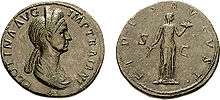Pompeia Plotina
Pompeia Plotina Claudia Phoebe Piso, or simply Pompeia Plotina (died 121/122) was a Roman Empress and wife of Roman Emperor Trajan. She was renowned for her interest in philosophy, and her virtue, dignity and simplicity. She was particularly devoted to the Epicurean philosophical school in Athens, Greece.[1] She is often viewed as having provided Romans with fairer taxation, improved education, assisted the poor, and created tolerance in Roman society.
| Pompeia Plotina | |||||||||
|---|---|---|---|---|---|---|---|---|---|
| Augusta | |||||||||
 Pompeia Plotina coin, celebrating the Fides on the reverse. | |||||||||
| Empress of the Roman Empire | |||||||||
| Tenure | 98–117 | ||||||||
| Predecessor | Domitia Longina | ||||||||
| Successor | Vibia Sabina | ||||||||
| Born | Tejada la Vieja (Hispania) | ||||||||
| Died | 121/122 | ||||||||
| Spouse | Emperor Trajan | ||||||||
| |||||||||
| Father | Lucius Pompeius | ||||||||
| Mother | Plotia | ||||||||
Life
Plotina was born and was raised in Tejada la Vieja (Escacena del Campo) in the province of Hispania, possibly during the reign of Roman Emperor Nero (r. 54–68). However, she could have been born in the 70s CE. She was the daughter of Lucius Pompeius and Plotia, who had extensive political and familial connections. Trajan married her before his accession and, although a happy marriage, they had no known children.
Upon entering the imperial palace following Trajan's ascension, Plotina is said to have turned to those watching her and carefully announced, "I enter here the kind of woman I would like to be when I depart."[2] It was through acts like this she sought to dispel the bad taste of domestic strife that had characterized the reign of Domitian as well as the Julio-Claudian dynasty, where she acted like a traditional Roman matron, and was associated with chaste goddesses like Vesta, the guardian of Rome's sacred fire, and Minerva, goddess of war and wisdom.[3] In 100, Trajan awarded her with title of Augusta, but she did not accept the title until 105. Plotina did not appear also on the coinage until 112.[1]
When the future emperor Hadrian and his sister lost their parents at 10 or 11 years old, Trajan and the Roman officer Publius Acilius Attianus became their guardians; Hadrian was a first cousin once removed to Trajan (Trajan's father and Hadrian's paternal grandmother were siblings). Plotina was the matchmaker between Hadrian and his future wife Vibia Sabina.[4]
When a letter Trajan was said to have composed on his deathbed appeared in Rome with Plotina's signature on it, in which he adopted Hadrian and naming him successor to the Empire, suspicions were raised. It was rumoured that Attianus and the Empress Plotina had been lovers, both were very fond of Hadrian their ward, both were present at Trajan’s deathbed at Selinus in Cilicia in August 117, and that the two had helped secure Hadrian's succession by forging Trajan’s will.[1]
Annelise Freisenbruch dismisses this accusation: "Plotina, the silent spouse of the second century, thus joined Livia, Agrippina Minor, and Domitia in the gallery of Roman imperial women accused of covering up or conspiring in their husband's deaths." Freisenbruch notes that there are many plausible explanations why Plotina's signature might legitimately be on this declaration: Trajan may have simply been too weak to sign the letter himself. Freisenbruch also notes these kinds of accusations have dogged the spouses of rulers through the centuries.[5]
Along with Attianus and Matidia, the grieving widow Plotina accompanied Trajan’s body to Seleucia and his ashes to Rome.
It was while a widow that Plotina's best documented action took place. During the year 121, while the emperor Hadrian was inspecting the provinces, Plotina and he engaged in a series of letters discussing who should be the new head of the Epicurean school of philosophy in Athens. She petitioned for a change in the law, which would allow Popillius Theotimus, the acting head of the school, to become the actual head; in response, Hadrian agreed with her argument, and the relevant letters were preserved in a series of inscriptions. Freisenbruch notes, "In stark contrast to her passive anonymity in the literary record, this inscription from Athens recasts Plotina as a highly educated woman, active on behalf of causes close to her heart and with the kind of access to the emperor once enjoyed by Livia."[6]
When Plotina died of illness, she was deified. Hadrian built a temple in her honor at Nîmes, in Provence.
Nerva–Antonine family tree
Nerva–Antonine family tree | |
|---|---|
| |
| Notes:
Except where otherwise noted, the notes below indicate that an individual's parentage is as shown in the above family tree.
| |
References:
|
References
- Simon Hornblower and Anthony Spawforth-E.A. (edd.), Oxford Classical Dictionary, Oxford University Press, 2003, p. 1214.
- Dio Cassius, LXVIII, 5
- Annalise Freisenbruch, Caesars’ Wives: Sex, Power, and Politics in the Roman Empire (London and New York: Free Press, 2010), pp. 159–161
- Historia Augusta, "Hadrian", 3; translated by Anthony Birley, Lives of the Later Caesars (Harmondsworth: Penguin, 1976), p. 59
- Freisenbruch, Caesars’ Wives, pp. 162f
- Freisenbruch, Caesars’ Wives, pp. 163f
Further reading
| Wikimedia Commons has media related to Plotina. |
- (in French) Minaud, Gérard, Les vies de 12 femmes d’empereur romain - Devoirs, Intrigues & Voluptés , Paris, L’Harmattan, 2012, ch. 6, La vie de Plotine, femme de Trajan, pp. 147–168.
| Royal titles | ||
|---|---|---|
| Preceded by Domitia Longina |
Empress of Rome 98–117 |
Succeeded by Vibia Sabina |